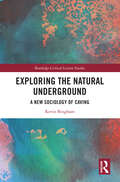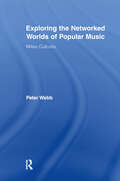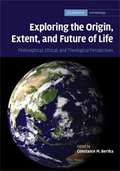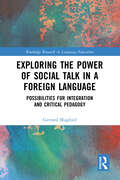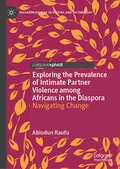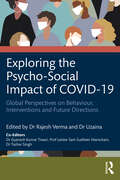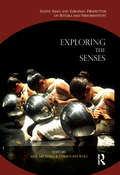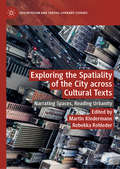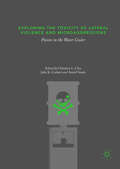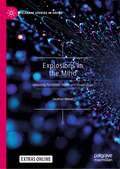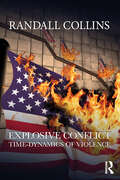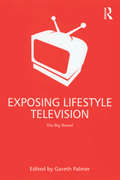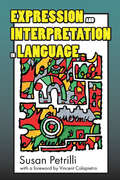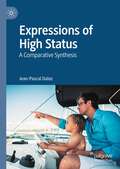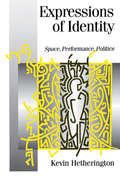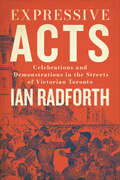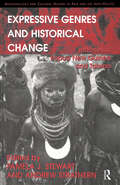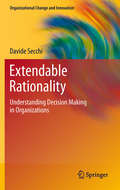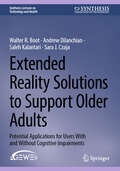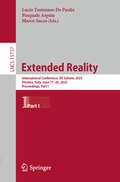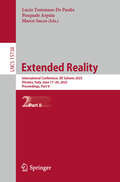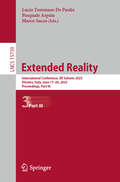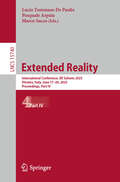- Table View
- List View
Exploring the Natural Underground: A New Sociology of Caving (Routledge Critical Leisure Studies)
by Kevin BinghamThis book explores the enigmatic world of the natural underground, viewing it as a site of leisure and a primary sphere of anthropotechnics. It reshapes the old language of caving into new ideas that broaden the possibilities of the sociology of caving. After outlining a novel methodological approach that can be used to understand new leisure trends and cultures in present modernity, Exploring the Natural Underground offers a comprehensive investigation of the societal context in which caving takes place. Thereafter, it goes on to argue that the natural underground can be used as a means of escaping some of the unavoidable influences of consumer capitalism in the way that it stimulates imaginations, senses and emotions differently. Marking a turning point in the way that the natural underground is understood and the degree to which sensory dimensions of leisure are valued, this book will appeal to anybody interested in caving, as well as scholars and students of leisure studies, the sociology of leisure, the ethnography of leisure and human geography.
Exploring the Networked Worlds of Popular Music: Milieux Cultures (Routledge Advances in Sociology)
by Peter WebbThis book provides an `insider’ view of worlds of popular music. It shows the relationship between music, creativity, ideas and localities by looking at cities, independents, genre, globalization and musician’s relationships with each other. Webb examines groups of musicians, audiences and people involved in the music industry and shows the articulation of their position as well as how to understand this theoretically by looking at the city as a centre for music production; the industrial music inspired neo-folk genre; independence and its various meanings as a productive position in the music industry; the globalization of music; and musicians own narratives about working together and dealing with the industry. Utilizing case studies of a variety of different cities -- Bristol, London, New York, San Francisco, Berlin -- and genres -- Trip-hop, Hip-hop, Industrial, Neo-folk -- this volume is a landmark in popular music studies.
Exploring the Origin, Extent, and Future of Life
by Constance M. BertkaWhere did we come from? Are we alone? Where are we going? These are the questions that define the field of astrobiology. New discoveries about life on Earth, the increasing numbers of extrasolar planets being identified, and the technologies being developed to locate and characterize Earth-like planets around other stars are continually challenging our views of nature and our connection to the rest of the universe. In this book, philosophers, historians, ethicists, and theologians provide the perspectives of their fields on the research and discoveries of astrobiology. A valuable resource for graduate students and researchers, the book provides an introduction to astrobiology, and explores subjects such as the implications of current origin of life research, the possible discovery of extraterrestrial microbial life, and the possibility of altering the environment of Mars.
Exploring the Power of Social Talk in a Foreign Language: Possibilities for Integration and Critical Pedagogy (Routledge Research in Language Education)
by Gerrard MugfordThis book examines the fundamental interactional dimension to foreign language communication, including the establishment, development, consolidation and maintenance of interpersonal relations. It argues that interpersonal language use such as small talk, casual conversation and gossipy talk is not only key to meaningful and productive communication but that it is an essential dimension with respect to successful foreign language interaction and that engaging in interpersonal language is communicatively valuable and worthwhile in its own right. Crucially, it explores how teaching and learning can utilize the role of social talk and relational engagement in helping interactants to express, voice and convey their own values, attitudes and beliefs. Finally, it develops a critical relational pedagogy focused on language speakers’ needs, objectives and desires. Redressing the imbalance between transactional and interactional language teaching, and stressing the importance of phatic and relational language use in helping language users achieve their communicative goals, it will appeal to researchers, postgraduates, and scholars in the fields of education and linguistics.
Exploring the Prevalence of Intimate Partner Violence among Africans in the Diaspora: Navigating Change (Palgrave Studies in Victims and Victimology)
by Abiodun RaufuThis book investigates the high prevalence of intimate partner violence (IPV) among African immigrants across the world, addressing unique cultural contexts, acculturative stress, and identity which shapes their experiences. The author examines how migration-related stress, cultural norms, and systemic challenges intersect to influence intimate partner violence dynamics uniquely within the African diaspora. The book utilizes three theoretical frameworks to investigate this question: Urie Bronfenbrenner&’s ecological systems theory; John Berry&’s acculturation stress theory; and Kimberlé Crenshaw&’s intersectionality theory. This book situates the experiences of this unique immigrant population in the literature on IPV. It also provides global context by situating African diaspora experiences within broader discussions of intimate partner violence across immigrant populations. The author highlights the resilience and coping mechanisms of African IPV survivors and offers culturally sensitive strategies for prevention and intervention pathways to empowerment and healing.
Exploring the Psycho-Social Impact of COVID-19: Global Perspectives on Behaviour, Interventions and Future Directions
by Rajesh Verma UzainaThis comprehensive resource provides a one-stop information repository, exploring all psychological aspects of Covid-19. Divided into three sections, the book covers the psycho-social impact on society and individuals and our collective cooperative behaviour, as well as philanthropic efforts, coping strategies and technological interventions, and how lessons learned will help in preparedness for the future. Including case studies and the latest research from diverse scientific studies across different regions, this book examines how psycho-social paradigms changed as a result of the pandemic, and left their watermark on the human psyche. It also explores the coping strategies adopted to deal with this common aggressor and how the techniques varied in accordance with social, cultural and geographical factors. The final section offers new insights for the future, highlighting the psychological infrastructure required, the type of preparedness and handling strategies necessary to mitigate the impact of any future biogenic pandemics. Combining theory and practical application, this is a valuable reading for academics and researchers as well as practising psychologists, clinical psychologists, and law-makers who are concerned with mental health.
Exploring the Senses: South Asian and European Perspectives on Rituals and Performativity
by Christoph Wulf Axel MichaelsThis fascinating volume offers a transdisciplinary and transcultural approach to understanding the senses by exploring themes in anthropologies of sound, sight, smell, taste, touch, and movement as expressed through aesthetic, perceptual, religious, and spiritual experiences. In drawing upon comparative perspectives from Indian and Western theories, the essays demonstrate the integral relation of senses with each other as well as with allied notions of the body, emotion and cultural memory. Stressing the continued relevance of senses as they manifest in a globalized world under the influence of new media, this work will interest scholars of anthropology, cultural studies, sociology, ritual studies, psychology, religion, philosophy, and history.
Exploring the Spatiality of the City across Cultural Texts: Narrating Spaces, Reading Urbanity (Geocriticism and Spatial Literary Studies)
by Martin Kindermann Rebekka RohlederExploring the Spatiality of the City across Cultural Texts: Narrating Spaces, Reading Urbanity explores the narrative formations of urbanity from an interdisciplinary perspective. Within the framework of the “spatial turn,” contributors from disciplines ranging from geography and history to literary and media studies theorize narrative constructions of the city and cities, and analyze relevant examples from a variety of discourses, media, and cities. Subdivided into six sections, the book explores the interactions of city and text—as well as other media—and the conflicting narratives that arise in these interactions. Offering case studies that discuss specific aspects of the narrative construction of Berlin and London, the text also considers narratives of urban discontinuity and their theoretical implications. Ultimately, this volume captures the narratological, artistic, material, social, and performative possibilities inherent in spatial representations of the city.
Exploring the Toxicity of Lateral Violence and Microaggressions: Poison In The Water Cooler
by Christine L. Cho Julie K. Corkett Astrid SteeleExamining the subtle forms of aggression, violence, and harassment that occur in our society and manifest in institutions and places of work, the expert contributors collected here describe the experience of social marginalization and expose how vulnerable individuals work to navigate exclusionary climates. This volume explores how bodies disrupt the status quo in multiple contexts and locations; provides insights into how institutions are structured and how practices that may cause harm are maintained; and, finally, considers progressive and proactive alternatives. This book will be a key resource for academics and professionals in education, sociology, nursing, law, business and political science, as well as organizations and policymakers grappling with aggression in the workplace.
Explosions in the Mind: Composing Psychedelic Sounds and Visualisations (Palgrave Studies in Sound)
by Jonathan WeinelThis book explores how to compose sounds and visualisations that represent psychedelic hallucinations and experiences of synaesthesia. Through a detailed discussion regarding compositional methodologies and technical approaches, the book aims to educate students, practitioners, and researchers working in related areas. It weaves together sound, visual design, and code across a range of media, providing conceptual approaches, theoretical insights, and practical strategies, which unlock new design frameworks for composing psychedelic sounds and visualisations.
Explosive Conflict: Time-Dynamics of Violence
by Randall CollinsThis sequel to Randall Collins' world-influential micro-sociology of violence introduces the question of time-dynamics: what determines how long conflict lasts and how much damage it does. Inequality and hostility are not enough to explain when and where violence breaks out. Time-dynamics are the time-bubbles when people are most nationalistic; the hours after a protest starts when violence is most likely to happen. Ranging from the three months of nationalism and hysteria after 9/11 to the assault on the Capitol in 2021, Randall Collins shows what makes some protests more violent than others and why some revolutions are swift and non-violent tipping-points while others devolve into lengthy civil wars. Winning or losing are emotional processes, continuing in the era of computerized war, while high-tech spawns terrorist tactics of hiding in the civilian population and using cheap features of the Internet as substitutes for military organization. Nevertheless, Explosive Conflict offers some optimistic discoveries on clues to mass rampages and heading off police atrocities, with practical lessons from time-dynamics of violence.
Explosivity: Following What Remains
by Javier Arbona-HomarHow explosions across history reveal the violence embedded in San Francisco&’s landscape Offering a novel approach to contemporary landscape studies, Explosivity unearths the hidden legacies of violence that have shaped the physical and cultural environment of the San Francisco Bay area. As he sifts through the historical debris of previous centuries, Javier Arbona-Homar analyzes a series of explosions that took place between 1866 and 2011 to call attention to the scattered remnants of militarism and racialized capitalism embedded in the region&’s geography. From incidents involving nineteenth-century explosives manufacturing and World War II munitions loading to radical activism and contemporary television productions, Arbona-Homar locates a pattern of historical violence that refocuses the broader racial and colonial context. Citing the material, social, and political conditions that gave rise to these disparate episodes, he reviews the historic erasure of those driving forces and puts forth alternative possibilities for how such disasters might be memorialized. Synthesizing a diverse set of field research methods, including oral histories and site visits, and supplemented by specially commissioned landscape photographs by Andrea Gaffney, Explosivity presents a radical exercise in the exposition of public memory. Retail e-book files for this title are screen-reader friendly with images accompanied by short alt text and/or extended descriptions.
Exposing Lifestyle Television: The Big Reveal
by Gareth PalmerIn the last decade lifestyle television has become one of the most dominant television genres, with certain shows now global brands with formats exploited by producers all over the world. What unites these programmes is their belief that the human subject has a flexible, malleable identity that can be changed within television-friendly frameworks. In contrast to the talk shows of the eighties and nineties where modest transformation was discussed as an ideal, advances in technology, combined with changing tastes and demands of viewers, have created an appetite for dramatic transformations. This volume presents case studies from across the lifestyle genre, considering a variety of themes but with a shared understanding of the self as an evolving project, driven by enterprise. Written by an international team of scholars, the collection will appeal to sociologists of culture and consumption, as well as to scholars of media studies and media production throughout the world.
Expression and Interpretation in Language
by Susan PetrilliThis book features the full scope of Susan Petrilli's important work on signs, language, communication, and of meaning, interpretation, and understanding. Although readers are likely familiar with otherness, interpretation, identity, embodiment, ecological crisis, and ethical responsibility for the biosphere-Petrilli forges new paths where other theorists have not tread. This work of remarkable depth takes up intensely debated topics, exhibiting in their treatment of them what Petrilli admires-creativity and imagination. Petrilli presents a careful integration of divergent thinkers and diverse perspectives. While she abandons hope of attaining a final synthesis or an unqualifiedly comprehensive outlook, there remains a drive for coherence and detailed integration. The theory of identity being advocated in this book will provide the reader with an aid to appreciating the identity of the theorizing undertaken by Petrilli in her confrontation with an array of topics. Her theory differentiates itself from other offerings and, at the same time, is envisioned as a process of self-differentiation. Petrilli's contribution is at once historical and theoretical. It is historical in its recovery of major figures of language; it is theoretical in its articulation of a comprehensive framework. She expertly combines analytic precision and moral passion, theoretical imagination and political commitment.
Expressions of High Status: A Comparative Synthesis
by Jean-Pascal DalozThis book is an unprecedented effort to compare representations and practices of social distinction worldwide and over the centuries. It is based on years of observation in many countries and on the consultation of more than 2 500 multi-disciplinary publications dealing directly or indirectly with this theme. In two previous theoretical volumes on the topic (The Sociology of Elite Distinction and Rethinking Social Distinction) welcomed as major breakthroughs, Jean-Pascal Daloz has established himself as the foremost scholar of symbolic social superiority from a comparative perspective. After having rigorously shown the limits of the main analytical frameworks available and outlined a much more inductive approach, his new empirical book continues this intellectual journey. Taking into consideration all sorts of cases and patterns of meaning, it offers an impressive synthesis demonstrating how diverse the expressions of high status can be. This comparative work is intended to be a crucial reference point and an important source of inspiration for researchers and students across many fields.
Expressions of Identity: Space, Performance, Politics (Published in association with Theory, Culture & Society)
by Kevin HetheringtonThis innovative book sets out to question what we understand by the term `new social movements'. By examining a range of issues associated with identity politics and alternative lifestyles, the author challenges those who treat new social movements as instances of wider social change while often ignoring their more `local' and `dispersed' importance. This book questions what it means to adopt an identity that is organised around issues of expressivism - and offers a series of non-reductionist ways of looking at identity politics. Hetherington analyzes expressive identities through issues of performance, spaces of identity and `the occasion'. This important work shows how the significance of identity politics are at once local, plural, situated and topologically complex.
Expressive Acts: Celebrations and Demonstrations in the Streets of Victorian Toronto
by Ian RadforthIn nineteenth-century Toronto, people took to the streets to express their jubilation on special occasions, such as the 1860 visit of the Prince of Wales and the return in 1885 of the local Volunteers who helped to suppress the Riel resistance in the North-West. In a contrasting mood, people also took to the streets in anger to object to government measures, such as the Rebellion Losses bill, to heckle rival candidates in provincial election campaigns, to assert their ethno-religious differences, and to support striking workers. Expressive Acts examines instances of both celebration and protest when Torontonians publicly displayed their allegiances, politics, and values. The book illustrates not just the Victorian city’s vibrant public life but also the intense social tensions and cultural differences within the city. Drawing from journalists’ accounts in newspapers, Expressive Acts illuminates what drove Torontonians to claim public space, where their passions lay, and how they gave expression to them.
Expressive Genres and Historical Change: Indonesia, Papua New Guinea and Taiwan (Anthropology and Cultural History in Asia and the Indo-Pacific)
by Andrew StrathernThis collection of essays, edited by leading scholars in the field, focuses on how expressive genres such as music, dance and poetry are of enduring significance to social organization. Research from New Guinea, Indonesia and Taiwan is used to assess how historical changes modify these forms of expression to adjust to the social and political needs of the moment. The volume is unique in exploring the significance of expressive genres for the social processes of coping with and adjusting to change, either from outside forces or from internal ones. The contributions detail first-hand fieldwork, often conducted over a period of many years, and with each contributor bringing their experience to bear on both the aesthetic and the analytical aspects of their materials. Comparative in scope, the volume covers Austronesian and non-Austronesian speakers in the wider Indo-Pacific region.
Expulsions
by Saskia SassenSoaring income inequality and unemployment, expanding populations of the displaced and imprisoned, accelerating destruction of land and water bodies: today's socioeconomic and environmental dislocations cannot be fully understood in the usual terms of poverty and injustice, according to Saskia Sassen. They are more accurately understood as a type of expulsion--from professional livelihood, from living space, even from the very biosphere that makes life possible. This hard-headed critique updates our understanding of economics for the twenty-first century, exposing a system with devastating consequences even for those who think they are not vulnerable. From finance to mining, the complex types of knowledge and technology we have come to admire are used too often in ways that produce elementary brutalities. These have evolved into predatory formations--assemblages of knowledge, interests, and outcomes that go beyond a firm's or an individual's or a government's project. Sassen draws surprising connections to illuminate the systemic logic of these expulsions. The sophisticated knowledge that created today's financial "instruments" is paralleled by the engineering expertise that enables exploitation of the environment, and by the legal expertise that allows the world's have-nations to acquire vast stretches of territory from the have-nots. Expulsions lays bare the extent to which the sheer complexity of the global economy makes it hard to trace lines of responsibility for the displacements, evictions, and eradications it produces--and equally hard for those who benefit from the system to feel responsible for its depredations.
Extendable Rationality
by Davide Secchi"How do people make decisions in organizations?" is the question at the core of this book. Do people act rationally? Under what conditions can information and knowledge be shared to improve decision making? Davide Secchi applies concepts and theories from cognitive science, organizational behavior, and social psychology to explore the dynamics of decision making. In particular, he integrates "bounded rationality" (people are only partly rational; they have (a) limited computational capabilities and (b) limited access to information) and "distributed cognition" (knowledge is not confined to an individual, but is distributed across the members of a group) to build upon the pioneering work of Herbert Simon (1916-2001) on rational decision making and contribute fresh insights. This book is divided into two parts. The first part (Chapters 2 to 5) explores how recent studies on biases, prospect theory, heuristics, and emotions provide the so-called "map" of bounded rationality. The second part (Chapter 6 to 8) presents the idea of extendable rationality. In this section, Secchi identifies the limitations of bounded rationality and focuses more heavily on socially-based decision processes and the role of "docility" in teaching, managing, and executing decisions in organizations. The practical implications extend broadly to issues relating to change and innovation, as organizations adapt to evolving market conditions, implementing new systems, and effectively managing limited resources. The final chapter outlines an agenda for future research to help understand the decision making characteristics and capabilities of an organization.
Extended Reality Solutions to Support Older Adults: Potential Applications for Users With and Without Cognitive Impairments (Synthesis Lectures on Technology and Health)
by Sara J. Czaja Walter R. Boot Andrew Dilanchian Saleh KalantariThis book explores one way in which recent hardware and software advances have placed humanity on the precipice of a significant shift in how technology can shape our interactions with the world around us: the application of transformative extended reality (XR) technology solutions to support the health, wellness, quality of life, and independence of older adults living with and without cognitive impairments. The book provides an overview of the state-of-the art research on XR-based solutions utilizing virtual reality (VR) and augmented reality (AR), challenges that can addressed with these technologies, evidence to date on the efficacy of these solutions, and the nature of these solutions and challenges to their implementation. It explores practical ways XR can be integrated into health and lifestyle maintenance activities for older populations in a diversity of situations through thematic chapters using realistic personas and scenarios. These thematic chapters are organized around the AGE-WELL Challenge Area topics, including staying connected, healthy lifestyles and wellness, mobility, and cognitive health, as well as an additional emphasis on leisure. Other chapters provide guidance on important issues to consider when designing XR-based solutions for older adults, how to evaluate and test XR solutions, the implementation of the user-centered design process, and the book concludes by highlighting unanswered questions and future research directions. This book approaches XR for older adults with and without cognitive impairments from the authors’ diverse research backgrounds in psychology, engineering, gerontology, and design. It will be of interest to academic and industry professionals as well as care providers considering the potential for XR interventions now and in the future.
Extended Reality: International Conference, XR Salento 2025, Otranto, Italy, June 17–20, 2025, Proceedings, Part I (Lecture Notes in Computer Science #15737)
by Lucio Tommaso De Paolis Pasquale Arpaia Marco SaccoThe seven-volume set LNCS 15737-15743 constitutes the proceedings of the International Conference on Extended Reality, XR Salento 2025, held in Otranto, Italy, during June 17-20, 2025.The 128 full papers presented together with 65 short papers were carefully reviewed and selected from 256 submissions. The papers are organized in the following topical sections:Part I: Virtual Reality; and Augmented and Mixed Reality.Part II: Extended Reality; and Extended Reality in Education and Learning.Part III: Transforming Research and Clinical Interventions with eXtended Reality.Part IV: Digital Twin: Innovative Approaches in Industry and Healthcare.Part V: eXtended Reality for Cultural Tourism Sustainability; eXtended Reality for Art, Design, and Entertainment; and Digital Twin and Smart Virtual Representations for Cultural Heritage.Part VI: Crafting Virtual Humans for Immersive XR Applications; and eXtended Reality for Serious Games.Part VII: Artificial Intelligence; Integrating Artificial Intelligence, Computer Vision and Augmented Reality in Computer-Assisted Intervention; and AI-Driven XR Innovations in Healthcare: Bridging Technology and Ethics.
Extended Reality: International Conference, XR Salento 2025, Otranto, Italy, June 17–20, 2025, Proceedings, Part II (Lecture Notes in Computer Science #15738)
by Lucio Tommaso De Paolis Pasquale Arpaia Marco SaccoThe seven-volume set LNCS 15737-15743 constitutes the proceedings of the International Conference on Extended Reality, XR Salento 2025, held in Otranto, Italy, during June 17-20, 2025.The 128 full papers presented together with 65 short papers were carefully reviewed and selected from 256 submissions. The papers are organized in the following topical sections:Part I: Virtual Reality; and Augmented and Mixed Reality.Part II: Extended Reality; and Extended Reality in Education and Learning.Part III: Transforming Research and Clinical Interventions with eXtended Reality.Part IV: Digital Twin: Innovative Approaches in Industry and Healthcare.Part V: eXtended Reality for Cultural Tourism Sustainability; eXtended Reality for Art, Design, and Entertainment; and Digital Twin and Smart Virtual Representations for Cultural Heritage.Part VI: Crafting Virtual Humans for Immersive XR Applications; and eXtended Reality for Serious Games.Part VII: Artificial Intelligence; Integrating Artificial Intelligence, Computer Vision and Augmented Reality in Computer-Assisted Intervention; and AI-Driven XR Innovations in Healthcare: Bridging Technology and Ethics.
Extended Reality: International Conference, XR Salento 2025, Otranto, Italy, June 17–20, 2025, Proceedings, Part III (Lecture Notes in Computer Science #15739)
by Lucio Tommaso De Paolis Pasquale Arpaia Marco SaccoThe seven-volume set LNCS 15737-15743 constitutes the proceedings of the International Conference on Extended Reality, XR Salento 2025, held in Otranto, Italy, during June 17-20, 2025.The 128 full papers presented together with 65 short papers were carefully reviewed and selected from 256 submissions. The papers are organized in the following topical sections:Part I: Virtual Reality; and Augmented and Mixed Reality.Part II: Extended Reality; and Extended Reality in Education and Learning.Part III: Transforming Research and Clinical Interventions with eXtended Reality.Part IV: Digital Twin: Innovative Approaches in Industry and Healthcare.Part V: eXtended Reality for Cultural Tourism Sustainability; eXtended Reality for Art, Design, and Entertainment; and Digital Twin and Smart Virtual Representations for Cultural Heritage.Part VI: Crafting Virtual Humans for Immersive XR Applications; and eXtended Reality for Serious Games.Part VII: Artificial Intelligence; Integrating Artificial Intelligence, Computer Vision and Augmented Reality in Computer-Assisted Intervention; and AI-Driven XR Innovations in Healthcare: Bridging Technology and Ethics.
Extended Reality: International Conference, XR Salento 2025, Otranto, Italy, June 17–20, 2025, Proceedings, Part IV (Lecture Notes in Computer Science #15740)
by Lucio Tommaso De Paolis Pasquale Arpaia Marco SaccoThe seven-volume set LNCS 15737-15743 constitutes the proceedings of the International Conference on Extended Reality, XR Salento 2025, held in Otranto, Italy, during June 17-20, 2025.The 128 full papers presented together with 65 short papers were carefully reviewed and selected from 256 submissions. The papers are organized in the following topical sections:Part I: Virtual Reality; and Augmented and Mixed Reality.Part II: Extended Reality; and Extended Reality in Education and Learning.Part III: Transforming Research and Clinical Interventions with eXtended Reality.Part IV: Digital Twin: Innovative Approaches in Industry and Healthcare.Part V: eXtended Reality for Cultural Tourism Sustainability; eXtended Reality for Art, Design, and Entertainment; and Digital Twin and Smart Virtual Representations for Cultural Heritage.Part VI: Crafting Virtual Humans for Immersive XR Applications; and eXtended Reality for Serious Games.Part VII: Artificial Intelligence; Integrating Artificial Intelligence, Computer Vision and Augmented Reality in Computer-Assisted Intervention; and AI-Driven XR Innovations in Healthcare: Bridging Technology and Ethics.
